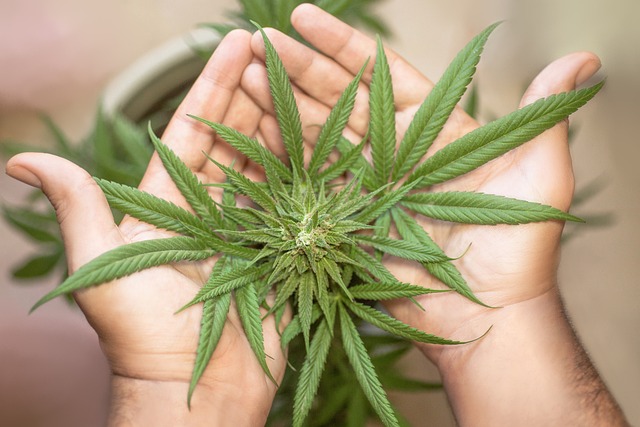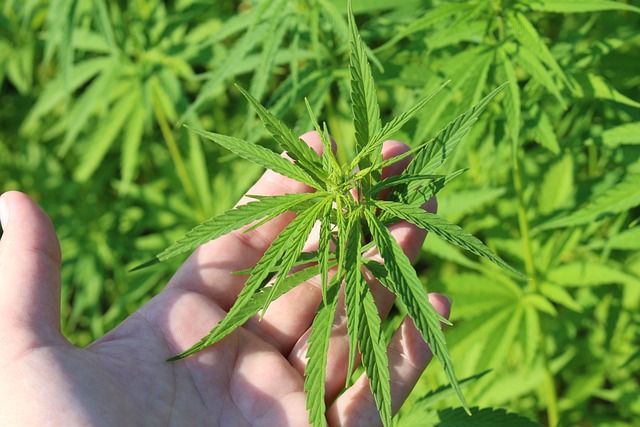Delta 9 THC and CBD gummies offer distinct experiences and potential health benefits, with Delta 9 providing psychoactive effects such as euphoria and relaxation, while CBD offers non-psychoactive therapeutic benefits including pain relief and anxiety reduction. Delta 9 bud is subject to more restrictive regulations due to its intoxicating nature, whereas CBD bud has become more legally accessible, especially after the enactment of the 2018 Farm Bill in the U.S., which allowed hemp-derived CBD products containing less than 0.3% Delta 9 THC. Users must consider individual factors like tolerance and dosage, as well as legal restrictions by region when choosing between these two products. Both have different safety profiles: Delta 9 can impair cognition and motor skills, potentially leading to safety concerns, while CBD is generally considered safer with fewer side effects. It's crucial for consumers to source products from reputable vendors to ensure quality and purity, and they should always consult healthcare providers before incorporating either cannabinoid into their wellness routine due to the potential for interactions with other medications. The legal status of Delta 9 and CBD products is complex and varies by jurisdiction, emphasizing the need for consumers to be well-informed about the laws in their area when considering Delta 9 bud versus CBD bud.
Delta 9 THC and CBD gummies offer distinct experiences, each with unique effects and potential benefits. This article delves into the pros and cons of these edibles, providing a clear comparison between Delta 9 ‘bud’ effects and those of their CBD counterparts. We explore the potency and psychoactive impact of Delta 9 gummies on user experience, offer insights into the legal landscape affecting access to both types, and address health implications and safety considerations when choosing between them. Understanding ‘delta 9 bud vs CBD bud’ is key to making an informed decision about which option aligns with your preferences and needs. Join us as we navigate the intricacies of these cannabinoid-infused treats.
- Understanding Delta 9 THC and CBD Gummies: A Comparative Analysis of Delta 9 Bud vs CBD Bud Effects and Benefits
- Delta 9 Gummies: Potency, Psychoactive Impact, and the User Experience
- Exploring the Legal Landscape and Accessibility of Delta 9 and CBD Gummies
- Health Implications and Safety Considerations When Consuming Delta 9 vs CBD Gummies
Understanding Delta 9 THC and CBD Gummies: A Comparative Analysis of Delta 9 Bud vs CBD Bud Effects and Benefits

Delta 9 tetrahydrocannabinol (THC) and cannabidiol (CBD) are two prominent compounds found in the Cannabis sativa plant, each offering distinct effects and potential benefits. When consumed as gummies, these compounds can provide a variety of experiences, from psychoactive to non-psychoactive.
Delta 9 THC gummies, often referred to as ‘Delta 9 bud’ due to their resemblance to edible cannabis flowers, contain the primary psychoactive component of cannabis. They are known for their euphoric and relaxing effects, which can alleviate stress, induce hunger, and elevate mood. The psychoactive properties of Delta 9 THC interact with the body’s endocannabinoid system, influencing neurotransmitter release and modulating brain activity, leading to its well-known mind-altering effects.
In contrast, CBD gummies, akin to ‘CBD bud’, are derived from hemp and contain cannabidiol, which is non-psychoactive. These gummies are celebrated for their therapeutic properties, including pain relief, anti-inflammatory benefits, and anxiety reduction. CBD interacts with the body’s endocannabinoid system in a different manner than THC, primarily by influencing receptors without directly binding to them, which can lead to a wide range of wellness benefits without the ‘high’ associated with Delta 9 THC. The choice between Delta 9 THC and CBD gummies depends on individual needs, preferences, and legal considerations, as the effects and legality vary by region. Consumers should carefully evaluate the pros and cons of each to determine which is more suitable for their particular situation.
Delta 9 Gummies: Potency, Psychoactive Impact, and the User Experience

Delta 9 gummies offer a distinctive and potent experience due to their psychoactive properties, which stem from the presence of THC, the primary psychoactive compound in cannabis. Unlike CBD bud, which is non-psychoactive, delta 9 bud induces a distinct euphoric sensation, often accompanied by a heightened sense of perception and altered time perception. Users typically report a full-body relaxation alongside cerebral uplift, making delta 9 gummies a popular choice for those seeking relief from stress or pain. The psychoactive impact varies depending on the individual’s tolerance and the dosage consumed; it can range from mild relaxation to intense hallucinogenic experiences, which is why it’s crucial for new users to start with a low dose and proceed cautiously.
The user experience with delta 9 gummies is highly subjective, influenced by factors such as individual physiology and the specific strain of cannabis used in their production. Users may notice differences in effects based on whether they’re consuming delta 9 gummies versus smoking delta 9 bud directly. Gummies provide a consistent and measured dose, allowing for predictable and controlled experiences, which can be beneficial for both therapeutic and recreational purposes. The long-lasting effects of delta 9 gummies mean that their impact is often felt for several hours, providing prolonged relief or enjoyment without the need for frequent re-dosing. As with any cannabis product, it’s important to consume responsibly and in accordance with local laws and regulations.
Exploring the Legal Landscape and Accessibility of Delta 9 and CBD Gummies

The legal status of Delta 9 and CBD gummies varies across different jurisdictions, presenting a complex landscape for consumers seeking these products. As of recent legislative changes, many regions have distinguished between Delta 9 THC and CBD, with the former remaining subject to more stringent regulations due to its psychoactive properties. In contrast, CBD, which is derived from hemp and contains minimal trace amounts of Delta 9 THC, has seen a surge in legal availability across various states and countries, thanks to the passage of the 2018 Farm Bill in the United States, which federally legalized hemp-derived products containing less than 0.3% Delta 9 THC. This legislative action has expanded the accessibility of CBD gummies, making them a more widely accessible wellness option compared to their Delta 9 counterpart. Consumers looking to differentiate between the two should be aware that while both types of gummies may offer therapeutic benefits, the legal distinctions and accessibility issues necessitate careful consideration when purchasing or using these products. The market for both Delta 9 bud and CBD bud has grown, but navigating the legality and availability can be a complex task that requires staying informed about the evolving regulations at local, state, and federal levels.
Health Implications and Safety Considerations When Consuming Delta 9 vs CBD Gummies

When considering the health implications and safety aspects of consuming Delta 9 versus CBD gummies, it’s crucial to understand the distinct effects and interactions each cannabinoid has with the human body. Delta 9 THC, the primary psychoactive component in cannabis, interacts with the endocannabinoid system, potentially offering therapeutic benefits such as pain relief and mood enhancement. However, its psychoactive properties can lead to impairment, altering perception, motor skills, and judgment. This can have significant implications for individuals who operate machinery or drive after consumption. In contrast, CBD, the non-psychoactive counterpart, does not produce a high but may alleviate anxiety, reduce chronic pain, and offer anti-inflammatory properties without the cognitive impairment associated with Delta 9.
Safety considerations for Delta 9 gummies revolve around their potency and the user’s tolerance level. High doses of Delta 9 can lead to adverse effects such as anxiety, paranoia, and acute psychotic episodes, especially in individuals predisposed to psychiatric disorders. It’s also important to note that Delta 9 is subject to legal restrictions, varying by jurisdiction, which must be carefully navigated. On the other hand, CBD gummies are generally considered safer, with a lower potential for adverse side effects and no psychoactive influence. Nonetheless, both Delta 9 and CBD can interact with certain medications, so it’s advisable to consult with a healthcare provider before incorporating them into one’s wellness regimen. Additionally, the quality and purity of products on the market can vary significantly, highlighting the need for caution and due diligence when selecting Delta 9 or CBD gummies. Consumers should prioritize purchasing from reputable sources to ensure a safe and consistent experience with their chosen product.
In conclusion, the consumption of delta 9 gummies versus CBD gummies presents a spectrum of effects and experiences, each with its unique pros and cons that users must consider. Delta 9 buds offer a psychoactive experience due to their THC content, which can enhance mood or provide pain relief, as outlined in our comparative analysis. Conversely, CBD buds provide therapeutic benefits without the high, making them accessible for broader uses. The legal status of these products varies, and it’s crucial to stay informed about local regulations. Users should also be mindful of the health implications and handle these substances with caution, especially considering their interaction with other medications or health conditions. Ultimately, whether opting for delta 9 buds for their intoxicating properties or CBD buds for their therapeutic effects, consumers must weigh the benefits against potential drawbacks to make an informed decision that aligns with their wellness goals and legal boundaries.
